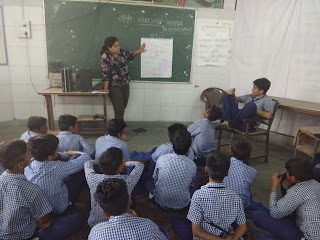‘Didi, I understand
what is violence and it’s wrong! Now tell me what I can do if I ever see
something like this happening in front of me?’
The session on ‘Gender
based violence’ with the second set of the participants began with the game of ‘Wolf
and sheep’ ; interestingly even before instructions were given, the boys in the
circle literally pounced on the person inside exactly behaving as wolf – this basically
set the tone of the workshop.
We engaged with the
boys to gather their understanding of violence in broader sense. Following this,
certain statements were read out and they were asked whether they think this
act comes under violence. They agreed that verbal abuse as in using cuss words,
molesting and raping girls, beating wife comes under violence but when they
rejected out rightly that if husband forces his wife to have sex- that doesn’t
come under violence.
‘If he doesn’t engage
in sex, then she might have sex with someone else?’
‘She might be having
affair that’s why she doesn’t want to have sex with her husband’
‘If he can’t have sex
with wife, where would he go?’
All these answers
indicated their inner fears, insecurity and toxic masculinity – so addressing this
became inevitable. When we said that there must be law against marital rape,
and people are working towards it, one of the participants said loudly, “This
is insane. Such laws shouldn’t be enforced; it’s so unfair towards boys.”
This is when once again
we realized the importance of our work at Sahas, when a 13 years old think this
way, has this sort of mindsets what kind of man he would become? This ignorance
if addressed now can actually support him in challenging these stereotypes and
debunking toxic masculinity.
Another statement was
that girls take privilege of these laws and can get innocent people in jail! I
was wondering how these messages are integrated in their young minds- only one
way to deal with it was to show them the real picture. Sharing the narratives
to explain what gender discrimination does to girls, “As compared to boys,
girls get very less chances to go out and study. But when girls go out, boys
molest them, harass them and tried to touch them inappropriately. They get
scared, sometimes they don’t even understand how to tackle the situation so
they choose to ignore all this and never tell their parents. Because if they
tell their parents, either they will be locked in their homes with the fear
that something can happen to them or with an accusation that they must have
done something to attract the attention of boys. They won’t be allowed to
study, then maybe they would be married off and boom they lose every chance to
make their dream come true!”
The boys were silent,
almost surprised and pained that what action they consider small might ruin a
girl’s life.
Following this
discussion, gender based violence, various forms and laws against violence were
explained. It was interesting to see many boys asking as to what they can do to
prevent such incidence which definitely was a happy surprise for us. We at
Sahas have always been told that it’s great that you are working with
adolescents and children, this information is much needed that’s all but they
can’t really challenge gender based violence. The non-availability of
information to the people is the biggest challenge in our country. Unfortunately
many a time’s people who have information don’t know how to actually curb the
distress or violence. We are actually resolving this gap between information
and action needed by demonstrating live examples of challenging the violence. We engage with adolescents by imparting the
information that is needed during their age group to address various changes
that are happening in their lives and around them, plus empowering them to take
actions in the situations and we are building gender sensitive mindsets in these
adolescents so that they are well informed and better citizens.
The interesting aspect
of safe space that we have co-created with adolescents is that without being
scared or ashamed, they are coming forward asking questions, discussing their
stories, asking for suggestions and building a connect with us as trusted
adults.
‘But how do I speak to
my sister. She is very shy and will never open up on these issues.’
This was one of the
most interesting queries which is also a step towards building better society
not just for ourselves for others as well.
“When we came to speak
to all of you, we were 2 stranger girls. You didn’t know us; we build
conversations slowly and bonded with every workshop. Now see how far have we
come, you ask any sort of questions with us. If you can talk to strangers then
what is stopping you from speaking to your own sister.”
With these two
interventions, the whole objective of engaging with adolescent boys has taken a
different turn. The boys hear so many things, they think on the same lines,
they experiment and abide to toxic masculinity and peer pressure which results
in not understanding consent, engaging in gender based violence and exerting
the superiority of their gender – so now that they have understood how wrong is
this, they can challenge the narrative and build better society where people
get to do what they wish for irrespective of their gender, color, caste or
creed! Huge dream, Vast vision but small steps towards the goal, I am very
happy that I am able to contribute to this dream of world free of gender based
violence.




































